Our mission is to offer a progressive range of treatments that help you keep a healthy smile, combat gum disease and to ensure that your own natural teeth are preserved as much as possible. This means that tooth extraction will only be carried out when absolutely necessary. We call this minimally invasive dentistry.
Our general dentistry treatments listed below are designed to help you regain an optimal level of oral health, especially after incidences of gum disease or tooth decay.
This treatment is carried out by one of our dental hygienists who will ensure that harmful plaque and bacteria are eliminated, leaving your whole mouth and teeth spotless.
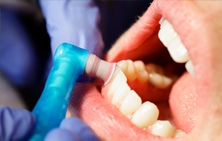
When gum problems evolve they become periodontal disease, it is important to carry out a more thorough clean in order to get rid of the solidified plaque and tartar which could harbour the infection.
Make an enquiry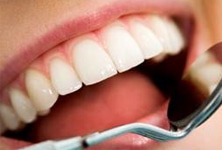
Fillings are used when you experience early tooth decay which result in external damage of the enamel and dentin. Your dentist will remove the decayed portion of the tooth and fill the area painlessly and with materials which blend in with your tooth colour.
Make an enquiry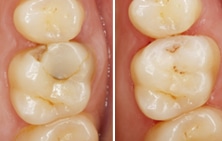
A root canal treatment is carried out when the diseased core of a tooth is likely to cause an infection and needs to be removed. In order to repair and avoid tooth extraction, one of our dental professionals will take away the diseased centre of the tooth in which the nerves are situated and cover it with a shielding cap.
Make an enquiry
If you have broken a tooth, there is a chance that it will need to be removed to avoid spreading infection. Depending on the severity of the damage, your dentist will recommend substituting the broken tooth with a choice lifelike prosthetic appliance so that no one will be able to tell.
Make an enquiry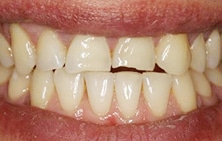
Oral cancer has been reported to be amongst the cancers which are the most frequently detected. The prevalence of oral cancer has gone up by 25% over the past decade with indulgence in tobacco and/or alcohol being the main causes. When detected early, this type of cancer is not life threatening as figures show that 90% of people who receive early treatment are cured, whereas a delay in treatment lowers the figure to 50%. It is therefore essential to alert us without delay if you have:
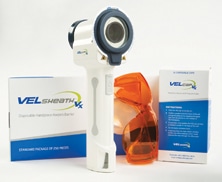
At HSDG we are equipped with the latest detection technology and are able to rapidly diagnose any signs of oral cancer as well as advising on any necessary treatment.
You would also be advised about new dietary requirements once the oral cancer is under control so that you minimise the risk of any relapse.
Sustaining a good dental routine is one of the most effective way to avoid the risk of any infection that would lead to gingivitis and periodontal disease.
Regular brushing (twice daily) using fluoride paste is important to avoid plaque bacteria forming in the mouth. Plaque (a clear sticky substance which contains bacteria) has a tendency to stick to the teeth and gums resulting in gum disease and tooth decay developing.
Tooth decay occurs most when eating foods that contain starch or sugar which turn to acids, which then eat away at the teeth. These acid attacks occur for 20 minutes after eating or drinking, destroying tooth enamel and encouraging the spread of bacteria which feeds on the detritus.
If plaque build-up accumulates on your teeth, dental calculus (also known as tartar) starts to appear. Tartar mineralises onto the teeth and is therefore a lot more challenging to eliminate than plaque and, if developed along the gumline, harmful poisons are released causing an infection and swelling of the gums. Pockets around the gums then start to develop with an increasing risk of infection. This explains why it is essential that gum disease is treated without any delay to avoid having an adverse impact on bone tissue and losing teeth.
The risk of gum disease can be reduced by maintaining good oral hygiene and enforcing regular brushing, preventing plaque from accumulating in the mouth. Flossing and interdental cleaning are also good ways of preventing gum disease. This should be accompanied by regular visits at the dentist and a thorough clean by a hygienist will also help maintaining good oral health.
An indication that you may have early gum disease (also known as gingivitis) is your gums look red, swollen and bleeding. If you notice some bleeding when cleaning your teeth, you should continue brushing as normal without pressing too hard to avoid any gum damage and recession, and book an appointment with your dentist.
Adults are advised to use a toothbrush which has a small or medium head and soft or medium bristles. For hard to reach areas, it is recommended to use small heads for ease of movement. Children should us smaller sized brushes with soft or medium bristles. If you have dexterity issues (Parkinson's or arthritis) there are specific brushes available to suit your needs.
For your toothbrush to be effective in removing plaque and reducing the risk of gum disease and decay, the head needs to be in good condition. It is therefore essential that you change your toothbrush every two to three months.
When brushing, it is important that you focus on all areas to get rid of food particles and plaque, especially the back of the mouth and behind the teeth. For optimal efficiency, your brush needs to be angled against the gum line at 45 degrees and used in circular motions around every tooth, including the outer, inner and back surfaces. We also recommend that you brush your tongue to eliminate bacteria and ensure your breath is fresh.
For maximum effectiveness on the biting areas, it is recommended that you hold your brush vertically and move it round and round in a small circular motion.
It is recommended that you clean your teeth two times daily for 3 minutes with a manual brush and 2 minutes with an electric brush, preferably in the morning and before you go to bed. Any soreness, irritation or bleeding should be notified to your dentist without any further delay.
Food and debris easily get trapped in between your teeth and brushing alone does not seem to be able to remove all material, resulting in a higher risk of plaque build-up. An interdental brush is therefore an ideal tool to keep the mouth and teeth clean and healthy.
A toothbrush cannot always be effective for hard to reach areas and tight spaces. Dental floss can hugely help reduce the risk of plaque accumulation although some people find it a bit difficult to use. Interdental brushes are comparatively easier to handle.
Whether the method is used to complement flossing or used as an alternative, interdental cleaning helps remove foods and debris stuck in between the teeth and help prevent plaque build-up. An interdental brush has a thin brush head made of small, fine bristles which you insert gently in between the teeth and which help remove plaque build-up which could lead to inflammation of the gums and gum disease.
With interdental cleaning, the use of a variety of sized brushes is not uncommon. Typically, front teeth require the use of the thinner brushes while broader brushes can be a better fit for the molars at the back of the mouth. It is important not to force the brush into the space and in any doubts, start with the finest brush first.
The brush needs to be pushed gently into the gap with a twisting movement and removed in the same manner until the space is clean. You can also bend and curve the head for more efficient cleaning results. You will only be able to use your interdental brushes a few times.
Using interdental brushes could not be easier and does not require you to be in a specific setting. There is no limit as to the number of occasions when you use interdental brushes, however to avoid plaque accumulation, it is recommended that interdental cleaning is carried out 3 times a week.
Interdental brushes are especially recommended to help clean around brackets and wires for people wearing orthodontic appliances. They are also used a lot amongst implant wearers to prevent serious diseases which can affect soft tissue and the bone, especially immediately after the implants have been inserted.
Brushing your tongue is as important as cleaning your teeth and interdental cleaning since it is a breeding ground for bacteria which can easily extend to your teeth and gums.
Bacterial build-up and food debris trapped on your tongue are not just responsible for halitosis (bad breath) but also known to lead to tooth decay and early stages of gum disease. Good oral hygiene therefore necessitates your tongue to be thoroughly cleansed with a tongue cleanser.
A Tongue Detox Cleanser has an antibacterial coating which you simply scrape gently across the tongue area to comb up dead cells, bacteria, trapped food and any unpleasant smelling mucus. If you use it every day it will contribute to a better level of oral hygiene and your breath will smell better too.
It is recommended that smokers add the Tongue Detox Cleanser to their daily oral health routine to eliminate any deposit which is likely to cover your tongue. This will make the breath smell fresher and make things taste better too.
Ensuring that your teeth stay clean and healthy is of paramount importance. You need your teeth to perform so many different tasks which is why it is essential to preserve good dental health by adhering to a consistent and thorough oral hygiene routine.
This can be challenging and regular toothbrushing is not sufficient to remove all the accumulated food and plaque bacteria. Trapped foods and debris can be eliminated by using dental tape or floss as they can fit into any gaps and help combat bad breath, tooth decay and gum disease.
Break off eighteen inches/45 centimetres of dental tape or string floss per top or bottom row of teeth, allowing a section for each tooth. Position it between your two index fingers to create a bridge of floss of about 2.5 centimetres, which you then place between the gaps at either side of each tooth.
The floss needs to be used in a gentle in and out motion in the spaces around the teeth and gumline. Make sure you do not apply too much force and especially do not push it lower than the tooth root. It may be advisable to create a routine starting from the back left tooth and moving incrementally along to the next one and so on to ensure no tooth is missed out.
When flossing for the first time, it is not uncommon that the gums start bleeding. However this should stop quickly once the accumulated debris and plaque are removed from between the teeth. In the case of more persistent bleeding we would recommend that you should visit your dentist or hygienist to confirm whether you have gum disease and a more thorough cleaning is required.
There are alternatives to flossing for people who find it difficult to do so: Instead you can use a variety of interproximal cleaning tools and devices specially designed to help you clean between your teeth if floss proves fiddly. Why don't you ask us more and we can recommend the best one for you?

